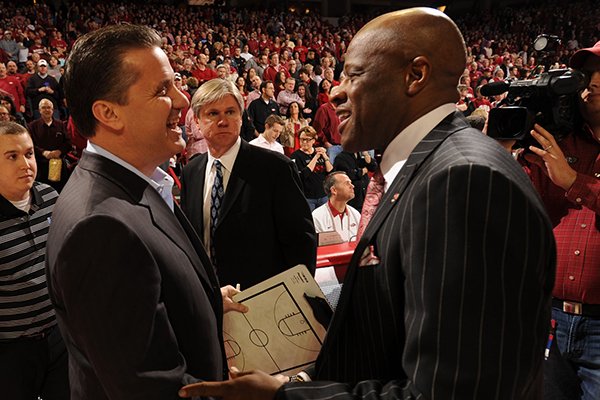FAYETTEVILLE -- NBA Commissioner Adam Silver is eager to do away with the "one and done" rule that allows college basketball players to declare for the NBA Draft after one year in college, and he has the support of SEC basketball coaches.
Silver and possibly the NBA players union appear to be making strides toward implementing a new standard -- two years out of high school or 20 years old -- for players who want to enter the NBA.
"It's something I'd like to see, because I think that one year -- and that's not against the players -- I just think sometimes it kind of makes a mockery of the college experience," Arkansas Coach Mike Anderson said Monday during the SEC coaches teleconference.
"Our game is in great shape, but, boy, it would really bolster our game," Auburn Coach Bruce Pearl said. "I personally think the student-athletes would win, the NBA would win, the college game would win and the fans would win. It would be the perfect adjustment to the current rule."
The current rule, requiring American players to be 19 and a year out of high school to be eligible for the draft, was enacted in 2005. Silver and his predecessor David Stern have both talked about changing the age limit to 20, a move that would have to be approved by the National Basketball Players Association.
"We're ready to go," Silver told The Associated Press earlier this year when discussing a meeting on the topic with NCAA President Mark Emmert. "We've been thinking about this issue for a long time."
Kentucky Coach John Calipari, whose stint in Lexington has featured a series of one-year players, including the recently drafted Julius Randle and James Young, said he'd support a change in the rules if issues like cost-of-living adjustments to scholarship money and insurance payments went in favor of the players.
"This [one-and-done] cycle that we're on ... it is so difficult," Calipari said. "To do this every year, in this environment at Kentucky is, I don't want to say impossible, because for five years we've done it ... but it's a dangerous thing for the coach.
"If it goes to two years, I think they'll be better prepared, but you cannot do that unless the NCAA is going to do things, along with the NBA, if kids are asked to stay another year."
Ron Klempner, acting executive director of the NBPA, said last month there was a "strong possibility" an adjustment to the rules could be made but it would likely come only with a concession.
The players association would want a mechanism in place that would allow high school graduates who are deemed NBA ready, such as LeBron James, to have access to the league. The Sports Business Journal reported last month a proposal by the players along those lines is in the works.
"As it is, there is a small window for NBA players to earn their living, and we're not interested in making it any smaller," Klempner said at a question-and-answer session at a Sports Lawyers Association conference in Chicago last month. "If we force a capable 19-year-old player to wait another year before he can start working and earning in the NBA, we can't give that year back to him when he's 35.
"That being said, if the league is willing to agree that capable players can start earning in the NBA a year earlier when they're 18, we could have a discussion about whether players who decide to go to college should do so for two years and not one."
A move of that type would put the NBA closer in line with Major League Baseball, which requires players who decline to go pro immediately after high school to wait three years before being eligible for the amateur draft.
"I think baseball has it right," Anderson said. "You either go out of high school or you wait until you're mature enough to go and make a difference."
Pearl said he believes the change in basketball would benefit the players because many who have left early weren't able to cash in on their second contract because they were so young and their game hadn't progressed enough to maximize their earnings. He said a change also would benefit the college game because fans would see a better brand of basketball.
" Just think about what Kansas would look like if those two kids [Andrew Wiggins and Joel Embiid] were coming back," Pearl said. "What Duke would look like if those two kids [Jabari Parker and Rodney Hood] were coming back. What Kentucky would look like if they had a couple of those guys coming back."
Calipari stressed the ultimate decision will be made by the NBA and the players association.
"We have to be on the side of the players, the side of the students," Calipari said. "How do we get them the information so they can make good choices."
With so many elements leaning toward a revamped rule, it might be only a matter of time before schools that land talented freshmen can be assured of two years from them.
"I feel it's probably trending that way, and so what's going to happen?" Anderson asked. "Hopefully the product that goes to the NBA is going to be much better and refined and ready to go in and help certain teams, as opposed to going in there and sitting and waiting."
Sports on 07/02/2014

